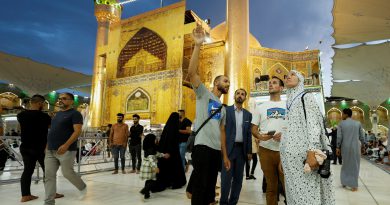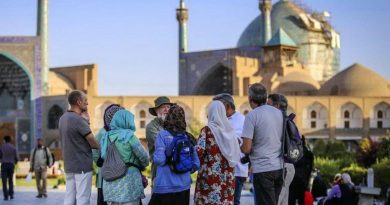Former Peace-TV host Musa Cerantonio leaves Islam
Sydney – The former Peace-TV host and ISIS propagandist Musa Cerantonio left Islam and became an atheist, according to his interview published by The Atlantic magazine on Thursday.
37-year-old Cerantonio was born in a middle-class Italian Australian family. He converted to Islam at the age of 17, and started showing an unusual inclination for linguistics and Islamic history.
He became famous as a white-convert to Islam, and later started lecturing about Islam in countries like Australia, Italy, Germany, Netherlands, India, Kuwait, Qatar, Philippines, etc.
He hosted numerous talk shows and Islamic programs on Dr. Zakir Naik’s Peace TV, and he also acted as an Emcee for Peace Conferences held in the Mumbai city of India.
His journey towards an ISIS propagandist
Cerantonio was a great admirer of signs of the end of times mentioned in Islam. Thus he became a part of apocalyptic propaganda during the Arab-Spring. His Youtube videos and Facebook posts revolved around the arrival of Imam Mahdi, the emergence of Dajjal (anti-christ), second-coming of Jesus, and the great Malhama (great battle).
Cerantonio would constantly attack the Arab monarchies like Saudi Arabia and UAE in his posts. He would call them ‘Taghut’ – false gods, for making alliance with the western countries.
By early 2014, he gained 12,000 followers on Facebook, and he used the platform for promoting the pro-ISIS narrative.
In June 2014, Cerantonio posted about the arrival of the Prophetic caliphate in Syria and Iraq under ISIS. He also declared that he would be traveling to give the pledge of allegiance to the ‘leader of believers’ Abu Bakar Al-Baghdadi. Sooner Facebook shutdown his account for violating the community standards.
However, Cerantonio was arrested in July 2014 in the central Philippines city of Lapulapu for overstaying his visa and then he was deported to Australia.
Australia’s Foreign Affairs Minister Julie Bishop called Cerantonio as a fraudster, and said, “He said he was fighting in Syria and Iraq, but he was holed up in the Philippines”. While investigation revealed that Cerantonio did the dodging technique to throw the police off the search.
Reason for leaving Islam
According to The Atlantic, Cerantonio became confused with Dhu-l Qarnayn figure of the Quran and Alexander – the great.
“Cerantonio did not see a resemblance between Dhu-l Qarnayn and the Alexander of history—but he noted similarities between Dhu-l Qarnayn and a heavily fabulized version of Alexander’s story written in Aramaic”.
“Realizing that Dhu-l Qarnayn was not at all a real person but was rather based on a fictional account of Alexander the Great instantly left me with only one possible conclusion: The Quran was not divinely inspired”, Atlantic quoted Cerantonio.
Cerantonio is an atheist now, who admires Richard Dawkins.
Reality behind Dhu-l Qarnayn of Quran
Quran mentions the story of a king called as Dhu-l Qarnayn whom God bestowed a vast Kingdom. Traditional Muslim scholars and historians call the interpretation of calling Dhu-l Qarnayn as a “specious argument”.
They argue that, “There is no mention in the Quran of how long Dhu-l Qarnayn (Alexander) lived, or of the era in which he lived”.
They say, “Dhu-l Qarnayn who is mentioned in the Quran is not Alexander the Macedonian or Greek who built Alexandria. This Alexander is the one who died at the age of 33, as mentioned in the Christian books. He lived 323 years before the birth of the Messiah (peace be upon him)”.
Further scholars say, “Dhu-l Qarnayn who is mentioned in the Quran lived at the time of Prophet Abraham, and it is said that he became Muslim at the hands of Abraham, and he went on pilgrimage to the Kaba walking. The scholars differed concerning him, as to whether he was a Prophet or a righteous slave and just king, but they agree that he was a Muslim, a monotheist and one who was obedient to Allah”.
Famous Muslim historian Ibn-Kathir in his book Bidayah Wal-Nahayah (1/493) mentioned, “Alexander was Dhu-l Qarnayn and his father was the first of the Caesars, and he was one of the descendants of Saam ibn Nooh (Shem the son of Noah). As for Dhu-l Qarnayn, he was Alexander son of Philip, son of Roomi son of al-Asfar son of Yaqaz son of al-‘Ees son of Issac son of Abraham. He is known as the Macedonian, the Greek, the Egyptian, builder of Alexandria, on the events of whose life the Greeks based their calendar. He came much later than the first Alexander. This was approximately three hundred years before the Messiah. The philosopher Aristotle was his minister and he is the one who killed Daar ibn Daar (Darius) and humiliated the kings of Persia and invaded their land”.
Based on the above historical records, Muslim scholars say, “We have drawn attention to him because many people think that they are one and the same and that the one who is mentioned in the Quran is the one whose minister was Aristotle, which has resulted in a lot of mistakes and far-reaching corruption. The former was a righteous believing slave and a just king, and the latter was a pagan and his minister was a philosopher. There were more than two thousand years between the two, so what comparison can there be between them? They are not alike at all and they have nothing in common, except in the mind of a fool who does not know anything”.
Muslim scholars or Ulema urge the followers to learn Islam based on Quran, authentic Prophetic narrations, and the way his companions comprehended and implemented. Self-study and self-interpretation is often deemed as a gate-way to misguidance and deviance.



